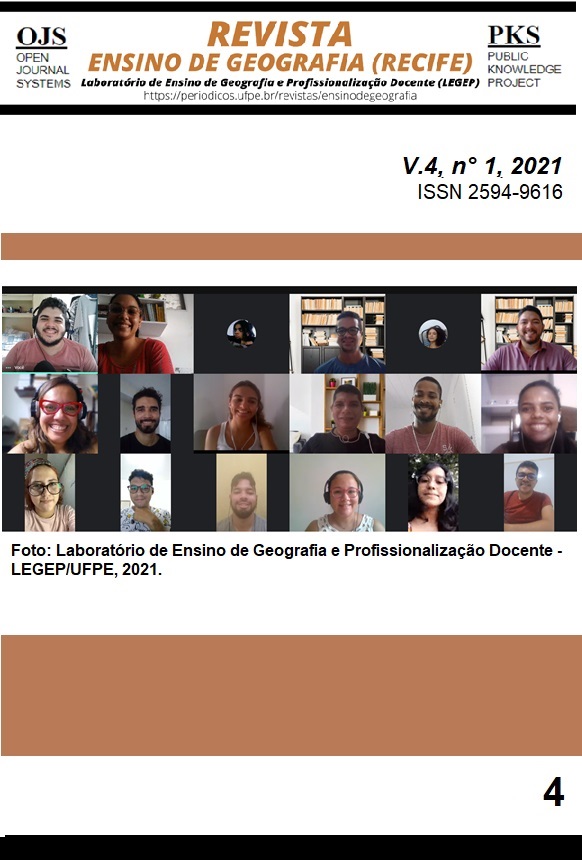Pedagogical experiences through pibid: reports and experiences in teaching geography
DOI:
https://doi.org/10.51359/2594-9616.2021.247880Keywords:
Geography teaching, PIBID, Pedagogical practices, School cartographyAbstract
This article presents a reflection and a report from the experiences and practices experienced through the Institutional Program for Teaching Initiation Scholarships - PIBID. To this end, a brief theoretical discussion was held regarding the teaching of geography and school cartography. Subsequently, two practices developed with students from an elementary school in the city of Passo Fundo / RS were reported, where the subproject PIBID - Geography of the University of Passo Fundo is inserted. The increase in PIBID in teacher training institutions, provides an opportunity to bring academic and school knowledge closer together. It is necessary to provide opportunities for the knowledge produced within these institutions to be in line with society, especially with the school environment when it comes to teacher training. In addition to highlighting the importance that PIBID has for teacher training, the need for adequate practices for effective cartographic literacy was highlighted, thus developing skills in orientation, localization and the decoding of cartographic language
References
ALMEIDA, R. D. de. Do Desenho ao Mapa: Iniciação Cartográfica na Escola. 4. ed. São Paulo: Contexto, 2010.
ALMEIDA, R. D.; ALMEIDA, R. A. Fundamentos e perspectivas da cartografia escolar no Brasil. Revista Brasileira de Cartografia, Rio de Janeiro, N0 63/4, p. 885-897, Jul/Ago/2014
BAPTISTA, N. L. Cartografia escolar, multimodalidade e multiletramentos para o ensino de geografia na contemporaneidade. Programa de Pós-graduação em Geografia da Universidade Federal de Santa Maria. Tese de Doutorado (Doutorado em Geografia), Santa Maria, 2019
BRASIL. Ministério da Educação. Base Nacional Comum Curricular – Ensino Fundamental. Brasília, 2018.
CASTROGIOVANI, A. C. Brincar e cartografar com os diferentes mundos geográficos: a alfabetização espacial. 1 ed. Porto Alegre: Editora PUC-RS, 2006.
DARROZ, L. M.; BETENCOURT, M. de F. B.; VALÉRIO, P. da S. Saberes e experiências em construção: a importância do PIBID. Curitiba: CRV, 2018.
PASSINI, E. Y. Reflexões metodológicas e cognitivas: aproximações entre sujeito e objeto In: Alfabetização cartográfica e aprendizagem de geografia. 1.ed. São Paulo: Cortez, 2012. p. 23-43.
MOREIRA, R. O discurso do avesso: para a crítica da geografia que se ensina. São Paulo: Contexto, 2014.
PONTUSCHKA, N. N.; PAGANELLI, T. L.; CACETE, N. H. Para ensinar e aprender Geografia. 3. Ed. São Paulo: Cortez, 2009.
PREFEITURA MUNICIPAL DE PASSO FUNDO. Parâmetros Curriculares de Passo Fundo/RS, p. 195 – 204, 2008
RIZZATTI, M. A cartografia escolar e as inteligências múltiplas no ensino de geografia:contribuições das geotecnologias no ensino fundamental. Programa de Pós-graduação em Geografia da Universidade Federal de Santa Maria. Dissertação de Mestrado (Mestrado em Geografia). Santa Maria, 2018.
SANTOS, R. L.; CARDOSO, D. L; BARBOSA, R. dos S. Princípios Básicos da Cartografia Escolar no Ensino Fundamental: Teoria e Prática. Revista de Ensino de Geografia, Uberlândia, v. 5, n. 8, p. 20-42, jan./jun. 2014.
Downloads
Published
How to Cite
Issue
Section
License
Copyright (c) 2021 Mateus Pessetti, Cristian Guilherme Lino

This work is licensed under a Creative Commons Attribution 4.0 International License.
Authors who publish with this journal agree to the following terms:- Authors retain copyright and grant the REVISTA ENSINO DE GEOGRAFIA (RECIFE) right of first publication with the work simultaneously licensed under a Creative Commons Attribution NonCommercial International 4.0 (CC BY-NC) that allows others to share the work with an acknowledgement of the work's authorship and initial publication in this journal.
- Authors are able to enter into separate, additional contractual arrangements for the non-exclusive distribution of the journal's published version of the work (e.g., post it to an institutional repository or publish it in a book), with an acknowledgement of its initial publication in this journal.
- Authors are permitted and encouraged to post their work online (e.g., in institutional repositories or on their website) prior to and during the submission process, as it can lead to productive exchanges, as well as earlier and greater citation of published work.



